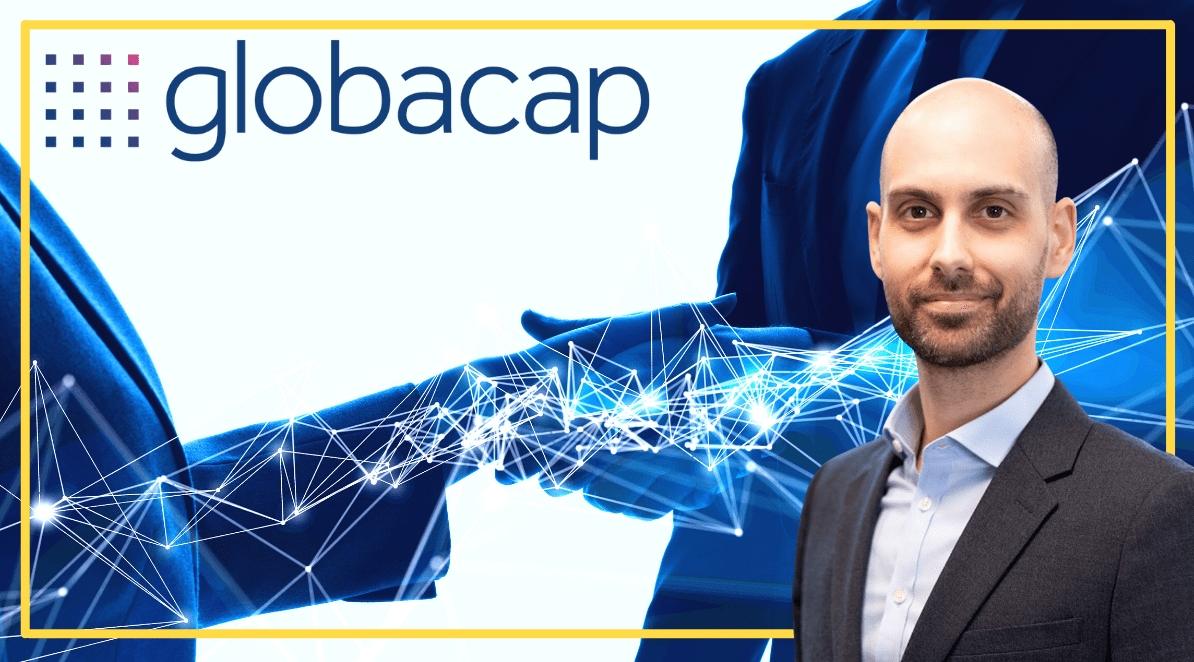Perhaps the best product of innovation in the crypto space over the last decade or so is not the virtual currencies themselves, but the underlying blockchain technology on which they are based. Although most commonly associated with cryptocurrencies, blockchain has various other applications in a wide range of industries from healthcare to supply chains.
Capital markets are no exception. We talked to Myles Milston, CEO of Globacap, to discuss how blockchain technology can facilitate a more efficient flow of capital. Globacap has digitised the shares offered by private companies on its platform and have built automated workflows on top of that. The result is three separate products: private placement, registry services and liquidity.
80 companies – whose shares are collectively valued at just over $7 billion – are using these registered products, with 30 private placements having been conducted on the platform to date. Globacap has also received a couple of big white label contracts, with the Johannesburg Stock Exchange (JSE) being the most prominent example. The JSE is using Globacap’s private placement workflow to help create an infrastructure investment platform across Africa.
The JSE will collaborate with Globacap to establish a private placements platform to advance and digitise capital raising for infrastructure finance and SMEs.
— JSE (@JSE_Group) November 5, 2020
Read more: https://t.co/vX4Y8Megz1 pic.twitter.com/3f43LLnqBP
Myles shared his thoughts with us on how adhering to existing regulations distinguishes Globacap’s digitised shares from other “securitised tokens,” how automated processes can make raising private capital more efficient, and how IPOs might be less relevant in the future.
A platform complying with regulation
Myles has a strong background in capital markets, initially starting as a programmer, then moving to investment banking, derivative structuring and trading. The crypto craze of 2017 inspired him to use the up-and-coming blockchain technology to streamline parts of private capital markets.
“In 2017, it was all about that crypto craze,” Myles notes, “where companies were doing Initial Coin Offerings (ICOs), coming to market and trying to raise money for their companies. What was interesting from that was that these small start-up companies were essentially issuing these tokens, which were being listed and traded in different exchanges around the world at the same time.”
This is contrary to how large traditional capital market firms and custodians have operated. Take, for instance, the procedure of dual listing. Companies listed on foreign exchanges have to issue a new trance of shares that big global custodians, such as BNY Mellon, hold in custody abroad. These custodians then create depository receipts, known as American Depositary Receipt in the US, and it is these receipts that are then listed as a new security for trading in the domestic market.
SHANGHAI DEBUT | LENOVO's DUAL LISTING
— Nikkei Asia (@NikkeiAsia) October 1, 2021
China's Lenovo, the world's biggest PC maker that trades on the Hong Kong stock exchange, will also list on Shanghai's tech-focused market. https://t.co/EVd4qrLCix
“It’s a very complicated procedure,” Myles argues. “It’s very expensive, and it requires a lot of moving parts. And even once you get there, they’re not exactly the same instrument because you’ve got the custodian sitting in the middle, making good on those obligations of dividend payments.”
“Compare that to what was happening in the tokenised world, where a tiny start-up company, for virtually no cost, was issuing these tokens that were suddenly trading on and transferred between these different exchanges in a uniform way. That made me start thinking, if the technology exists to do that, then what else can we now start to automate across the whole capital market spectrum by creating a real share and digitising it using blockchain? What automated processes can be built off the back of that?”
Many entities have tried creating tokenised shares in a bearer format, meaning whoever holds it is the owner. Establishing Globacap in 2017, Myles and his team took a different approach. They have decided to create a product that complies with regulations: digital shares that are registered assets.
“I think the key element about us is that we’ve used blockchain in a way that completely adheres to existing regulation,” he explains. “Companies around the world that have tried to do tokenised securities are essentially trying to create this new type of security that doesn’t quite fit in existing regulation. They’ve done it in a very specific context, but it can’t grow across wide capital markets like that. And existing regulation is really set. It’s very difficult to change, but it also doesn’t need to be changed, in our view.”
“So when creating the platform, we collected all the legal elements of shareholding. We broke apart all of those elements and digitized them. For instance, in the UK, there is a share certificate that is still a legally required instrument, and the blockchain itself generates that share certificate using a company’s digital signature, which we created with the encryption key.”
Automated processes
Globacap’s automated solutions assists with all stages of the private capital raising process, while also helping companies retain full control of their businesses. During the first step of the placement process companies can invite potential investors, which can range from individual and institutional investors to venture capital and private equity funds. By digitalising the due diligence process, Globacap helps companies filter potential investors and decide upon their most preferred option.
“Traditionally, in the world of private markets, you email someone a PDF, an overview document, or a pitch deck, and you have no idea if they’ve read it, if they’ve interacted with it, or if they’ve opened the email,” Myles explains.
“We, however, have completely digitised sharing memorandum and private placement documents on our platform. That means that investors can actually click through those documents, and companies can see which parts of the documents and data room the investors have looked at. Everything is tracked, so the company can see exactly how much interest there genuinely is.”
Globacap has also made KYC and anti-money laundering checks less cumbersome for investors and companies. Placing the company in the middle and acting as its custodian, Globacap addresses the potential problems associated with bilateral transactions and handing over sensitive personal KYC documentation.
Learn more: https://t.co/a6gnR2FtfM
— Globacap (@globacap) March 22, 2021
Due diligence is one of the most important tasks CFOs perform during a capital raise.
Benefit from suitability checks for 50+ countries, plus automated KYC & AML checks worldwide.#compliance finance #kyc #captable pic.twitter.com/BeJfakWbMw
Furthermore, Globacap is also an authorised custodian, holding the funds in custody throughout the subscription and investment process. At the appropriate moment Globacap also completes the settlement, the issuance of securities and transfer of funds to the company.
“If they are using us for register management,” Myles continues, “that last step, completing the transaction, is fully automated. This is where the automated component of the share issuance happens in the private blockchain that we’re hosting directly.”
“We have created in the blockchain all of the elements of the register itself,” he explains. “And then we linked to that a public transferable token, which can then be sent to a digital exchange. It can be transferred directly between people, automatically updating the private blockchain that’s behind the scenes on our platform. That is the legal register; that’s where the legal transfer of ownership takes place.”
“What we’ve enabled can now essentially be deployed across capital markets and fit exactly within regulations everywhere. And we’ve also got a token, which can be now sent to different exchanges really easily.”
The digital share is also equipped with built-in rules that ensure compliance with regulation, ensuring that the share will not allow itself to be transferred until conditions laid out in the rules have been met. For instance, the share is programmable in the blockchain to restrict someone’s ability to sell during lockup periods.
More recently, a liquidity product has been launched to complete Globacap’s private markets product offerings. The product is essentially a liquidity venue similar to NASDAQ Private Market, Forge, and CartaX, but the key difference is that Globacap has fully automated settlements.
“Those companies don’t get involved with settlements,” Myles explains. “They’re a matching service where investors match, but then they step out of the equation. Investors have to agree the terms themselves, settle with each other, make sure that the securities are going to be transferred, and agree a legal contract sale purchase agreement in the middle.”
“We’ve also designed it a little bit differently from those other venues, because we’ve designed our product in terms of liquidity rounds. This is where we put all of the control of the round in the company’s hands – they can set out the terms of the round and then any investor can come in and participate in that round.
“And this is also where the blockchain really comes in again. Because we’re acting as a custodian and cash comes in through our platform, all of those processes – the share register being updated, the shares being transferred, and then the new share certificate being issued automatically in a digital form – happen at that blockchain layer.”
Delayed IPOs – the future of capital markets?
Finally, Myles also shared with us his take on the future of capital markets. He thinks that as automated solutions will be used more and more in capital markets, IPOs might become redundant for small-cap companies.
“Let’s draw a line between what we call large caps, which are the really big companies like Google and Apple, and small caps, which are the smaller ones, such as the London Stock Exchange Alternative Investment Market (AIM). They’re companies that are valued at £100-200 million. There is not much trading that takes place on a daily basis, but they’re there. It’s in the case of these smaller assets that where it [digitising capital markets] makes a lot of sense.
“Because suddenly, you can have multiple pools of liquidity connecting together. And where normally there isn’t that much liquidity on the AIM on a daily basis, now you can have access to a much greater and wider pool of liquidity.
“So what I think it absolutely will do is push out the boundary where companies decide to go fully public. Because in our ecosystem, a company can stay completely private and still have their shares traded really easily in this format. They don’t have to become a public company. Becoming a public company places a lot of cost and administrative overhead. So if they can avoid that, then that’s even better.”
In-house Globacap research demonstrated that for 41% of mid-large companies, one of the biggest motivators to IPO is to realise liquidity by selling some of their shareholding. But at the same time, 88% would still like to keep the business private for as long as possible and hold off on an IPO or private equity buyout.
“There is still going to be a marketplace for really big companies going public, doing a huge IPO, but I think it’s going to get pushed out a lot and we’ll see smaller exchanges, like the London Stock Exchange A-market, essentially just disappear.”
We are excited to see if the more widespread use of blockchain technology will indeed cause a shift towards private funding in the capital markets space, and how automated solutions might further streamline the investment processes.
Author: Benjamin Jenei
#Crypto #Blockchain #CapitalMarkets #Digitisation #Regulation #ICOs #Tokenisation #Securities #Shareholding #VentureCapital #PrivateEquity #KYC #PublicMarkets #DigitalShares #Liquidity #AIM #IPOs















